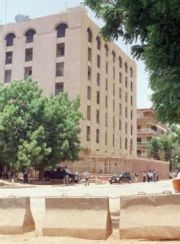US says it will not pay Sudan to admit equipment for new embassy
By Wasil Ali
January 23, 2008 (WASHINGTON) — The US said it will not pay Sudan any custom duties on equipments needed for new embassy complex currently being held by the authorities at Port Sudan.

The official who asked not to be identified said that Washington made its position clear on the matter to Sudanese officials. However he declined to spell out the steps should Sudan sticks to its position.
The Sudanese government has refused to release containers imported by the US embassy without payment of custom fees.
Sabir Mohammed Hassan, governor of Sudan Central said that his government will not to give the US embassy equipments “any special consideration”.
Hassan met last week with the visiting US Assistant Secretary of State for African Affairs Linda Thomas Greenfield and asked that Washington return money confiscated following a ruling by U.S. court that ordered Khartoum to pay some $8 million to the families of U.S. sailors killed in the bombing of an American naval destroyer seven years ago in Yemen..
He also told the Greenfield that the Sudanese embassy in Washington undergoes a mandatory audit on a regular basis which costs Khartoum over $3,000 monthly.
Sudanese officials have recently appeared to be taking a tougher stance on the issue of relations with Washington. Both countries have maintained excellent intelligence cooperation despite tense diplomatic relations. Yet it is not clear what Khartoum has received in return.
This week Mustafa Osman Ismail, Sudanese President’s adviser and senior National Congress Party (NCP) official, told US Chargé D’affaires Alberto Fernandez that his government will not normalize relations with Washington “for free”.
“Every concession in our end should be met with a similar concession from the US side” Ismail told reporters after his meeting with Fernandez.
The US diplomat has brought up the issue of the embassy containers with Ismail but told reporters afterwards that he had achieved little progress.
Press reports in Sudan have quoted government officials as saying that they are growing increasingly frustrated with the impact of US sanctions on their economy which prompted their central bank to convert their reserves from dollar to Euro.
Moreover Khartoum complains that the US is using its influence on International Monetary Fund (IMF) and the World Bank to prevent them from extending credit to Sudan under favorable terms.
Last May the US president George Bush ordered stiffened sanctions on Sudan that will bar 31 companies controlled by the government from doing business in the U.S. financial system as well as sanctions on four Sudanese individuals, including two senior Sudanese officials and a rebel leader suspected of involvement in the Darfur violence.
Last month US president Bush signed into a law the “Sudan Accountability and Divestment Act of 2007″ passed by the Congress.
The bill aims at providing protection from lawsuits to State and local divestment efforts in Sudan to sanction it over the Darfur crisis labeled genocide by the US administration.
The bill also allows asset managers to divest from foreign companies operating in Sudan without being deemed in violation of their fiduciary duty. Also no government agency shall grant federal contracts to companies believed to be conducting business in Sudan unless they certify otherwise.
The Sudan Accountability and Divestment Act of 2007 specifically targets the main sources of revenue of Khartoum; oil, power production, mining and military equipment. It will only impact foreign companies since most American businesses are prohibited from dealing with Sudan under executive order issued in 1997 by former president Bill Clinton.
(ST)
